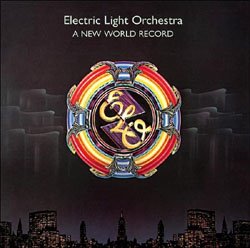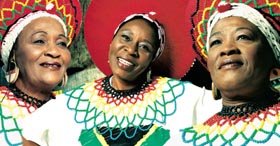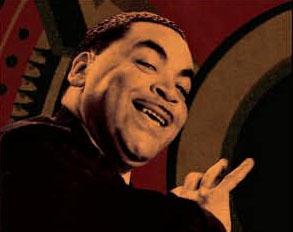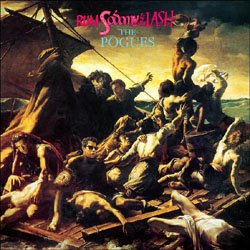
When looking for art-rock antagonists whose very existance made it necessary for punk to come along and wipe them out, the usual names you hear are ELP, Yes and Pink Floyd. Under some breathes are muttered another acronym supposedly symbolizing all of the bloated excess of 70's rock that killed the fun out of the music: ELO aka Electric Light Orchestra. They were an easy target because they not only used strings on their records but they actually had their own string section in the damn band. Even the last word in their name was "orchestra."
But beyond all the obvious pretentions on the surface lurked the band's mastermind, Jeff Lynne. A fanatic of the late Beatles material, he rose to recognition as part of the last phase of the Move, supposedly joining mostly to be involved in what was to become ELO. But in that short time that he was in the Move (early 70's), he worked alongside one of the great pop weirdos of the time: Roy Wood. Wood wasn't just the defacto leader and songwriter of the group, he also something of an odd visionary, looking to not only advance rock forward but to also head it back to its roots. During the end of the Move, Lynne no doubt learned alongside the master, producing one of his greatest tunes, the rock anthem "Do Ya" (which you've probably heard in commercials for Monster or Volkswagen by now). ELO was supposed to be the next phase for Wood/Lynne (along with Move drummer Bev Bevan) but Wood only stayed for one album before moving on, leaving the band to Lynne.
After some snoozy ballad-with-strings material that was maybe a cut above Mantovani (though their extended version of "Roll Over Beethoven" would have made Wood proud and "Evil Woman" still sounds pretty good) and which started to net him some gold records, Lynne finally bore down on his songwriting with their sixth album,
A New World Record (1976, now reissued on Epic/Legacy).
One big difference is that instead of making a faux-symphony or concept record (like
Eldorado), he learned how to have fun with the form as he did with Wood back in the Move days. He dared to take all the trappings of art rock and make a great pop record out of it the way his peers could only later dream of (but secretly wanted to as evidenced by Gabriel's "Sledgehammer" or ELP's dreaded
Love Beach or the Yes hit "Owner of A Lonely Heart").
That isn't to say that
ANWR is perfect- the title track is too desperate and serious and "Shangri-La" and "Above The Clouds" are as flighty as their titles but everything else is as peachy as you'd like power pop to be. It starts out omniously with synth buzz, swirling strings and choirs which makes you regret their pretentions but then in comes a wailing guitar, a 4-4 beat and soulful backing vocals to clear the decks on "Tightrope." Then there's one of their sweetest singles and ballads "Telephone Line" (complete with synths minicking the phone) which doesn't get soggy if only because Lynne REALLY does sound sad and depressed in the verses about those "lonely, lonely, lonely, lonely nights." And though a classic rock friend of mine hated "Rockaria!", I always thought it was a hoot- a smart, funny pairing of rock and roll and classical ambitions as much as their "Beethoven" cover.
After the title track brings down side one, the record recovers nicely with the soaring "So Fine" which leads perfectly into "Livin' Thing." Just as with "Telephone Line," Lynne knows how to use drama well, from the solo violin that starts the song to the catchy chorus that's echoed by the strings. Just remember the last scene in the 1997 movie
Boogie Nights (where Mark Wahlberg psyches himself up for a porn shoot by whipping it out) and how well that song makes the scene- it's one of the best music set-up's I've ever seen in a film and adds extra poignancy to the original song. After that, "Do Ya" sounds better than the original version both literally and figuratively. Not only is it now recorded better and clearer but Lynne rings more emotion out of it too, no matter how many commercials it's become fodder for by now. And he was right to re-record it not just for those reasons but also because, as he notes in the new liner notes, he wanted people to hear it again: by the time
ANWR came out, the Move version wasn't even in print anymore and that was going back only 3-4 years.
After
ANWR, Lynne was able to come up with other great, ambitious pop singles ("Turn To Stone," "Sweet Talkin' Woman," "Calling America") and not so ambitious stuff (which was both very good ("Don't Bring Me Down," "Hold On Tight") and very bad (i.e. "Shine A Little Light" and "Xanadu" with Olivia Newton-John) and a few more uneven ELO albums which still minted plenty of sales/$$$ before effectively retiring the band and becoming a producer and Traveling Wilbury. Meanwhile, Bevan revived the ELO name in the 90's, much to Lynne's chagrin. But regardless of his last 20-25 years,
ANWR is still Lynne's crowning achievement as an ambitious art-rocker and dreamy pop fanatic. At five million and counting, it's ELO's best-selling album by far and for a good reason.
 Part of the fun of MySpace is that you don't get to just meet kewl people but you can also find out about hep bands, even ones that haven't been hyped up elsewhere. That's part of the power of the Net, isn't it?
Part of the fun of MySpace is that you don't get to just meet kewl people but you can also find out about hep bands, even ones that haven't been hyped up elsewhere. That's part of the power of the Net, isn't it?



